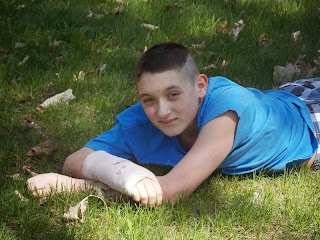When your child starts to fall behind the averages of his peers, it can be alarming. You may start to worry if and when the child will catch up. In the event your child is diagnosed with autism, you will look for therapy in hopes to catch him up to what is appropriate for his age level. And although you may see progress over the months, the rate of progress can be slow.
When your child is around age two, he may not look so different from other two-year-olds. Maybe he doesn't talk, and runs around wildly in circles, but he is still at the adorable toddler stage, where most on-lookers smile warmly in an understanding sort of way. (Sometimes you get the "you are a horrible parent" looks, but hopefully not as often.)
As your child grows and reaches age 4, he may be in a special needs classroom, where he may seem to be one of the higher functioning. As a parent, you focus only on his gains and progress and forget about "the gap".
The gap is where your child is compared to where other children his age are developmentally. When they are cute, silly, kindergartners, their delays are more prominent, but still the child is mostly quirky and enjoyable and their behavior is more acceptable.
The gap becomes more apparent by about third grade. Your child may have lost the chubby cheeks of their youth, but still love to play with Thomas the Tank Engine, while the other boys and girls in the regular education classrooms are looking for boyfriends and girlfriends.
I've watched my son progress, but as the years pass by the gap gets larger and more noticeable after a brief introduction. It is hard for him to read, and people are not quite as loving and understanding to a fifteen year old with pimples and a hint of a moustache. They act uncomfortable.
Even the nicest people, who would never be unkind....are sort of scared, and don't know what to say or how to react. Tristen doesn't notice it, but I do....and it breaks my heart.
This is what I wish they knew:
Include him, while understanding that in his attempts, the task may take longer and may not be done quite right. There may be some instances where things have to be done quickly and/or perfectly, but most of the time, these are only perceptions in our own minds.
Be flexible and understanding. Give him the choice to participate...gently encourage him to do so, but leave it ultimately up to him.
Remember that in his mind he is still a young child. Think about how you would treat a younger sibling or cousin. This is difficult as he grows older on the outside, but not so much on the inside.
Understand that he does not make eye contact or respond to questions easily, and it will take time for him to be comfortable and do so independently. Don't let this discourage you from communicating! He likes being noticed, but is embarrassed by it at the same time.
Don't laugh at him when he is being serious. If he is trying to tell you something and mixes up his words, or if he is reading...please be attentive and don't laugh. There are times when he is silly and having fun, and it would be appropriate to laugh with him, just not "at" him.
I sincerely feel people just don't know....no one has explained to them how to talk to a young adult with autism. We need to get the word out, because they are going to need the experience.

No comments:
Post a Comment